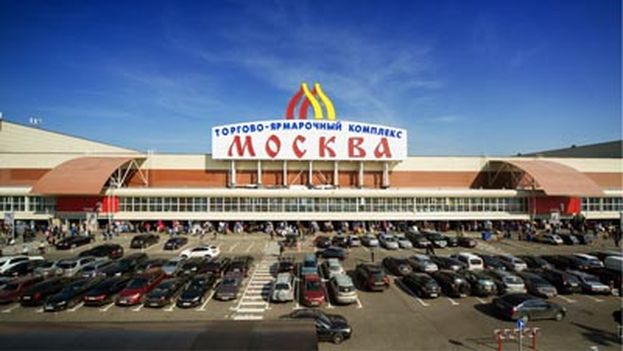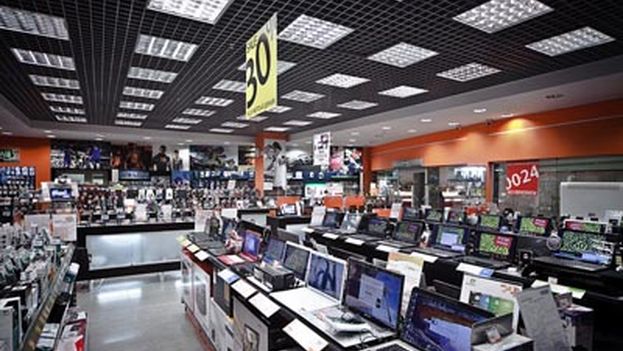
![]() 14ymedio, Luz Escobar, Havana, 25 August 2016 – For decades visiting Moscow was the golden dream, but only the most trusted could enjoy a stay in the Soviet Union. From these trips to the “godmother nation” they returned with suitcases filled with products unavailable in Cuba. Today, some take the same route, but this time they shop in a Russia with a market economy and well-stocked stores.
14ymedio, Luz Escobar, Havana, 25 August 2016 – For decades visiting Moscow was the golden dream, but only the most trusted could enjoy a stay in the Soviet Union. From these trips to the “godmother nation” they returned with suitcases filled with products unavailable in Cuba. Today, some take the same route, but this time they shop in a Russia with a market economy and well-stocked stores.
Most of them are “mules” who make the long journey to Pushkin’s native land to bring back shoes, clothing and Lada or Moskvitch car parts, which they sell in the informal market. Those with more resources pay for their own airline tickets, knowing that they can make back the money; but others offer the room in their suitcases in search of an investor to pay for the trip.
With the restrictions imposed late last year on the entry of Cubans to Ecuador, one of the most important routes of imports for the black market was closed. Russia, however, has continued its policy of not requiring visas from residents of the island, so the “mules” have reoriented their travel to Moscow, a route also widely used to emigrate.
The travel agency Ancon, located in a spacious property on Linea Street in Havana’s Vedado district, is taking advantage of the growth in interest in Russia to offer “shopping trip” packages to Moscow. There is no shortage of customers and the tour operator focuses on organizing visits to markets, filling travelers’ suitcases and facilitating getting the merchandise back to the island.
Vladimir Putin’s Russia has a commercial network unthinkable in Raul Castro’s Cuba. While the shelves of Havana stores display the same products over and over again, or are empty, Moscow’s markets are a permanent temptation to the wallet.
“The travel agency is part of the Russian company Kompozit 21 and has been operating in Cuba for three years,” says Ada Soto, an employee of Ancon. The CEO is Nikolay Popov, but in a spacious 16th floor apartment, two Cubans manage reservations and sales.
Soto explained to 14ymedio that since early this year business has significantly increased. Cubans who contract their services are received by one of their compatriots based in Moscow who greets them at the airport and will answer any questions in Spanish, while leading them to their hotel arranged from the island.
The seven-day packages that costs not more than $500 for accommodation, transfers and a guide, are the most sought after and the highlight is the tour of the a visit to the Sadovod marlet, a shopping mall with wholesale deals and more than 4,500 stores.
Most customers prefer to focus on shops and ignore Ancon’s cultural program with visits to museum. Cuban travelers seem more interested in the goods on offer and the sales rather than taking a look at the Red Square.
Vivian, 32, made the trip earlier this year. She says she spent it “eating hamburgers and pizza,” while acknowledging that “the Russian language is a bit of a problem, but if you speak some English and with a calculator in hand, no problem.” Together with her husband they bouhgt two passages and hired the services of Ancon. “It was a business trip,” she says.
The couple spent a day in Moscow in the Saviolovskiyo electronics market to stock up on photography and video equipment, mobile phones, tablets and other electronic devices, merchandise that can be sold at three times its value in the Cuban black market.
Vivian fed her nostalgia for the times when the Kremlin and Revolution Square were close with some Russian souvenirs, like matryoshka nesting dolls and decorated wooden crafts. She also fulfilled the request of her father in the Puerto Sur car market, buying some spare parts for his Volga.

The young woman’s husband was delighted with the Sokolniki shopping center with accessories for Jawa, Voskhod, Minsk, Karpati and Riga motorcycles, models that circulate widely on Cuba’s streets. With a couple of purchases made at the request of some friends he said he would “recover nearly half the money spent on tickets.”
The agency handled the transfer of goods to the hotel, gave them the use of a cellphone, and helped them manage the payment for an extra suitcase, in addition to the 33 kilograms they could bring home free, between a large bag and a piece of hand luggage.
On Revolico, the classified site similar to a Cuban Craigslist, they rented coats and boots because it was still “quite cold” when they landed in Moscow. The couple hopes to repeat the trip in late September and has already bought the tickets on Aeroflot for 630 convertible pesos each.
“I’ve realized a dream of my lifetime because when I was a chiquita my father went to Moscow on a trip he earned as a bonus for being a vanguard worker, but my trip was for shopping,” enthused Vivian while showing off some of her purchases. Unlike her father, she didn’t have to work overtime or demonstrate ideological fidelity to realize her dream.
